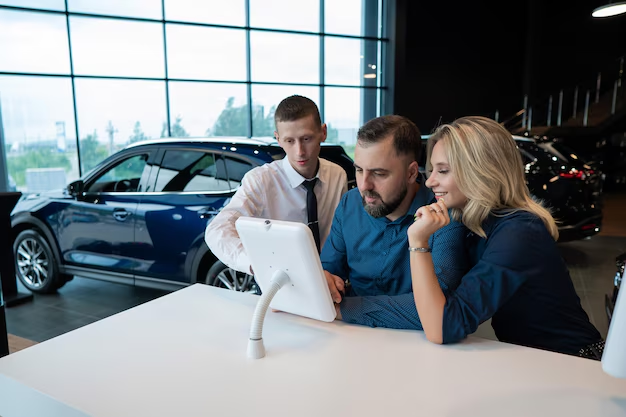What Car Dealers Do In-House Financing?
If you’re shopping for a car and struggling to secure financing through a bank or credit union, you might wonder, “What car dealers do in-house financing?” In-house financing, also known as Buy Here Pay Here (BHPH), is a helpful option for buyers with poor credit, limited credit history, or those who need fast approval. This guide explores which dealerships offer this type of financing, how it works, and what to watch for before making a decision.
What Is In-House Financing?
In-house financing is a car loan provided directly by the dealership instead of a third-party lender. The dealer acts as both the seller and the financier. This model is particularly common among used car dealers who cater to buyers needing quick access to credit.
Unlike banks that rely heavily on credit scores, in-house lenders usually assess factors like income and job stability. This makes them more flexible for people who’ve been turned away elsewhere. The entire process, from approval to payment, is handled by the dealership, creating a simplified car buying experience.

Types of Dealerships That Offer In-House Financing
You’ll find in-house financing primarily at:
- Independent used car dealerships that cater to buyers with low or no credit
- Special finance dealerships operating in urban or suburban areas
- Local car lots that advertise “Buy Here Pay Here” or “No Credit? No Problem!”
- Some franchise dealers that offer captive financing through their own brand’s financial services
Notable Dealerships with In-House Financing Options
Some car dealers across the U.S. are known for offering internal financing options. CarMax, through its own financing branch, is a popular option for people with average credit. DriveTime and Byrider specialize in working with subprime borrowers. Large franchise dealerships such as Toyota, Ford, and Nissan offer in-house loans through their finance companies, Toyota Financial Services, Ford Credit, and Nissan Motor Acceptance Company, respectively. These automaker-backed financing options are typically more structured and suited for buyers with moderate to good credit scores.
Understanding the In-House Financing Process
The process starts with a credit application submitted directly to the dealership. You’re often required to provide proof of employment, proof of residence, and identification. The approval process is usually quick, sometimes allowing buyers to drive away the same day.
Once approved, you choose from the dealership’s available inventory. Payments are made directly to the dealership, often on a weekly or biweekly schedule. While some in-house dealers offer online payment portals, many still require in-person payments. Interest rates may be higher than traditional loans, especially for buyers with credit challenges.
Advantages of Choosing In-House Car Financing
In-house financing offers several notable advantages:
- Faster approvals without needing a traditional credit score
- Convenient one-stop shopping experience for both vehicle and financing
- Greater flexibility for buyers with limited financial documentation
- Potential for credit improvement if the dealership reports on-time payments
What to Keep in Mind Before Signing
Despite the perks, in-house financing also comes with a few caveats. Interest rates can be considerably higher, and loan terms may be shorter, making monthly payments larger. Be sure to ask whether your payment history will be reported to credit bureaus, as this can affect your ability to rebuild credit. Always review the contract thoroughly, including any fees for late payments, early payoffs, or repossession policies.
Understanding the fine print can protect you from hidden costs and future financial strain. Dealerships that are upfront about total loan costs, interest rates, and payment schedules are more likely to provide a fair and manageable financing experience.

Alternatives to In-House Auto Loans
If you’re unsure whether in-house financing is your best option, consider applying through a local credit union or exploring online lenders. Some buyers choose to have a co-signer on their loan, which can help unlock better interest rates. Subprime lenders, which specialize in poor-credit loans, may also offer more favorable terms than certain BHPH dealerships.
Comparing loan terms, interest rates, and repayment flexibility across different options can help you make an informed decision. It’s important to balance speed and convenience with long-term affordability.
Real-World Example: How In-House Financing Helped a Buyer
Consider a buyer named Lisa, a single mother who recently changed jobs and has a limited credit history. When she visited a bank for a car loan, her application was denied because her credit score was below the acceptable range. Frustrated but determined, she visited a local dealership that advertised in-house financing. The dealer reviewed her recent pay stubs and verified her job status. Within a few hours, Lisa was approved and drove off with a reliable used vehicle. While her interest rate was slightly higher, the dealership reported her payments to the credit bureau. A year later, Lisa had improved her score enough to refinance at a better rate.
Stories like Lisa’s highlight the value of in-house financing for buyers who need a second chance and a practical way to get on the road fast.
The Role of Captive Financing vs. BHPH Dealerships
It’s important to differentiate between traditional in-house financing and captive financing. Captive financing is offered by a car manufacturer’s financial arm, like Toyota Financial Services or Ford Credit, and is typically available at franchise dealerships. These loans may offer promotional rates, rebates, or lease specials tied to specific models. However, they often require a better credit score.
On the other hand, Buy Here Pay Here dealerships are more independent and designed for customers with subprime credit. These dealers handle all aspects of the loan internally, from application to payment collection. While terms may not be as competitive, they offer valuable access to credit for people often excluded by mainstream lenders.
Tips for Choosing a Reliable In-House Financing Dealer
When selecting a dealership that offers in-house financing, be sure to do your due diligence. Research their reputation online and look for customer reviews about loan transparency, vehicle quality, and how they handle missed payments. Avoid dealers that don’t clearly outline loan terms or seem pushy about high-interest options.
You should also ask whether the dealership is licensed and if they report payments to credit bureaus. This last point is key, without it, your on-time payments won’t help improve your credit score.
It’s also wise to compare multiple dealerships. Even among in-house financing options, rates and requirements can vary widely. You may find one dealer asking for a larger down payment while another is more flexible. This flexibility can make a big difference when working within a tight budget.

In-House Financing vs. Lease-to-Own Options
Some car buyers confuse in-house financing with lease-to-own programs. While both are alternatives to traditional auto loans, they differ in ownership structure. With in-house financing, you become the vehicle owner once the loan is paid off. Lease-to-own programs may not grant full ownership until all terms are fulfilled, and they often come with restrictions on mileage or use.
Knowing the difference can prevent confusion and help you make the right long-term financial decision based on your goals, whether that’s rebuilding credit, owning a vehicle, or keeping monthly costs low.
How In-House Financing Can Rebuild Credit
If your dealership reports to the major credit bureaus, in-house financing can be a stepping stone toward financial recovery. Making consistent, on-time payments proves that you can manage debt responsibly, which gradually improves your credit profile.
After six to twelve months of on-time payments, some buyers qualify for refinancing at lower interest rates through banks or credit unions. Others may become eligible for better loan terms on their next vehicle purchase.
Think of in-house financing as both a transportation solution and a credit repair opportunity, but only if you’re working with a dealership that supports your long-term financial growth.
Frequently Asked Questions
Is the interest rate higher than with a bank loan?
Generally, yes. These loans usually carry higher interest rates due to the increased risk the dealership assumes.
Do all car lots offer in-house financing?
No, it’s mostly found at used car dealerships and certain franchise locations that work with manufacturer finance programs.
Final Thoughts
Finding out what car dealers do in-house financing is a valuable step for anyone facing credit challenges or looking for a faster path to vehicle ownership. This type of loan offers a streamlined process, flexible approval terms, and opportunities for people who’ve struggled to qualify for traditional loans.
However, it’s crucial to weigh the pros and cons. Take your time reviewing the financing terms, especially if the dealership doesn’t report to credit bureaus or charges unusually high interest rates. Whether you choose in-house financing, a bank loan, or a credit union, always base your decision on a thorough understanding of your financial situation and long-term budget.
At InhouseCarFinancing.org, we aim to connect you with transparent, reputable car dealers that offer reliable financing options without hidden surprises. Explore our listings and educational tools to find the best path forward on your car-buying journey.
